Alia Atkinson On Being The First Black Woman To Win A World Title, Manuel’s Ascent And The ISL
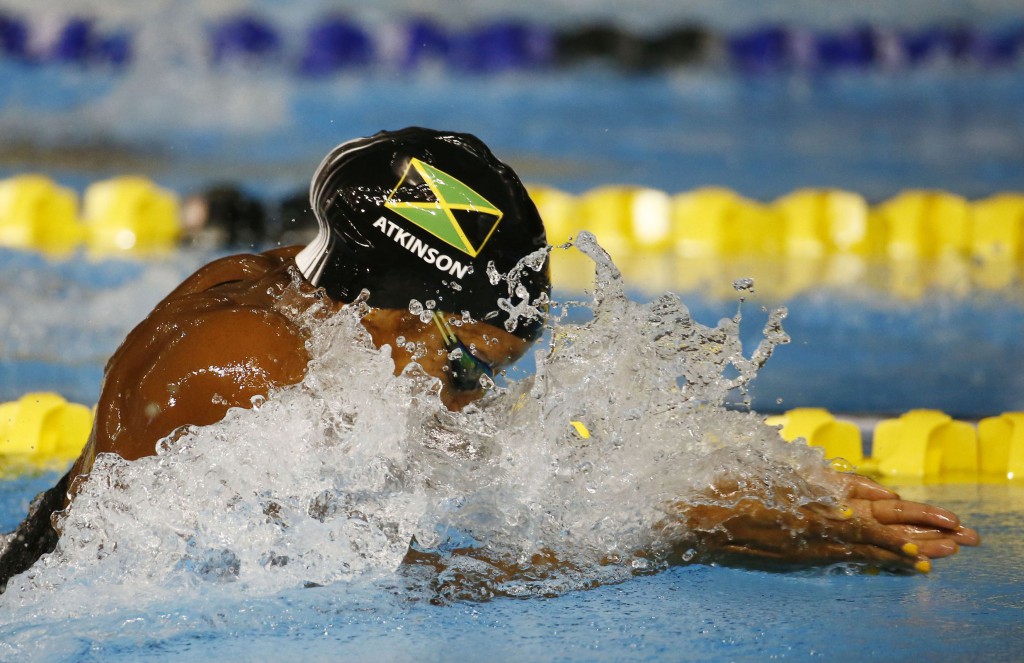
It is a moment that will live long for all those watching when Alia Atkinson won 100m breaststroke gold at the 2014 World Short-Course Championships to become the first black woman to win a world swimming title.
The Jamaican stopped the clock first in Doha but her reaction to victory was somewhat delayed.
When realisation dawned that she was indeed the champion, Atkinson was open-mouthed and wide-eyed, jumping high out of the water before covering her mouth, giggling.
On exiting the pool she saw she had equalled Ruta Meilutyte’s world record of 1:02.36 from October 2013, a mark that remains today almost six years later.
It wasn’t until the following hours and days when Atkinson learned she had made history as the first black woman to claim a global title in the pool.
And it took a long time to comprehend the enormity of what she had done.
Atkinson told Swimming World:
“It wasn’t until probably a couple of years later that it really sunk in what being the first woman of colour to get that medal really meant.
“It wasn’t just me getting the medal, it was more breaking down a barrier that I didn’t even know existed or I didn’t try to think existed because I was already trying to silence my own thoughts.”
In a wide-ranging interview with Swimming World, Atkinson talked about the changes she observes and welcomes in the sport, the International Swimming League, closely following the progress of Simone Manuel and the Jamaican’s own 2020 following the postponement of the Games in Tokyo.
Far too much to include in one article so more will follow in the coming weeks.
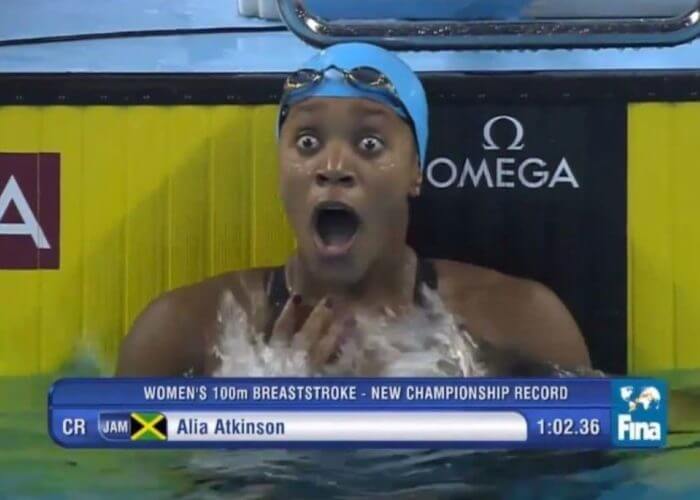
Photo Courtesy: EuroSport
For now we’ll head back to December 2014 and the days and hours building up to Atkinson’s historic performance.
In July of that year the then 25-year-old had won silver and bronze in the 50 and 100m breaststroke respectively at the Commonwealth Games in Glasgow, Scotland.
She enjoyed a successful World Cup season, testing herself in back-to-back meets, but mental fatigue had started to seep in going into Qatar.
She said:
“It was like ‘oh my gosh, I’m tired, everybody’s fresh, this is World Championships’. And also the media – yes, she’s been doing good, blah blah blah, this is why you don’t listen to the media – it’s something you have to learn.”
The 50m breaststroke was up first and Atkinson qualified second for the final with Meilutyte ominously setting a European record of 28.81 in the semis.
The Lithuanian then went on to retain the title she won two years prior in 28.84, 0.07 ahead of Atkinson in 28.91.
Come the 100 semis and Meilutyte qualified in pole in 1:02.43, just 0.07 outside her world record, with Atkinson booking her spot alongside the 2012 Olympic champion in lane five in 1:03.59.
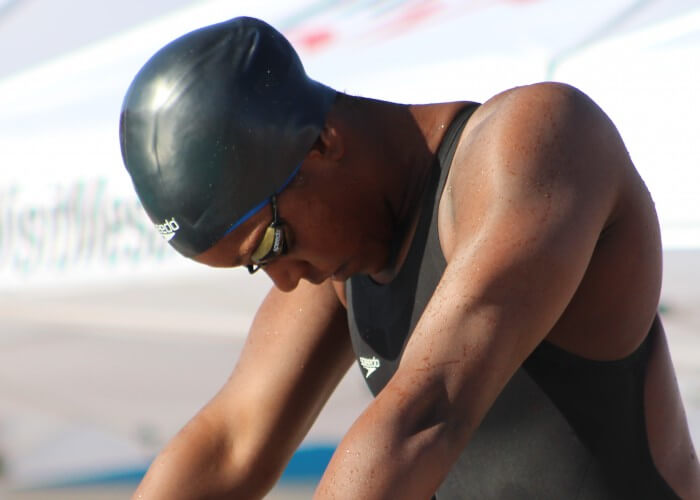
Photo Courtesy: Azaria Basile
The Lithuanian looked ominous and likely to make it double gold with Atkinson herself not really believing she could top the podium.
She did though have a huge desire to win and to prove to herself that she really was and is one of the elite, she did deserve to be there and take her rightful place among the world’s best, two years after she missed out on Olympic bronze by one place in London.
Atkinson was fourth in 2012 in a final won by Meilutyte, then aged 15, ahead of Rebecca Soni of the United States and Japan’s Satoma Suzuki, who finished 0.47 ahead of the Jamaican.
Casting her mind back to the evening of 6 December 2014, Atkinson recalls:
“It just seemed like I was an underdog but I didn’t even believe it myself. If it happens maybe, if not whatever, but I really wanted to win, I really wanted that chance to be like yes, 2012 wasn’t a hoax.
“I can be good, I can be somebody, I want to be somebody.
“And I remember getting touched out in the 50 and I was like ‘oh my word’ because it was my mistake – I should have lunged into the wall instead of doing a short stroke.
“And they’re the worst ones when you know you should have done something different and you didn’t.
“So I was internally beating myself up over that so the 100 came and I was second going into it and I just remember the what ifs.
“What if this happens? What if I do this? What if, what if, what if? And I remember just cancelling everything out and be like ‘I’m done – no, there’s no more what ifs. Let’s just do this’.”
Meilutyte had a superb start and was ahead by 0.36 at halfway but Atkinson executed her turns to the tee and on the final length the pair were stroke for stroke only for the Jamaican to nail her finish and take the title.
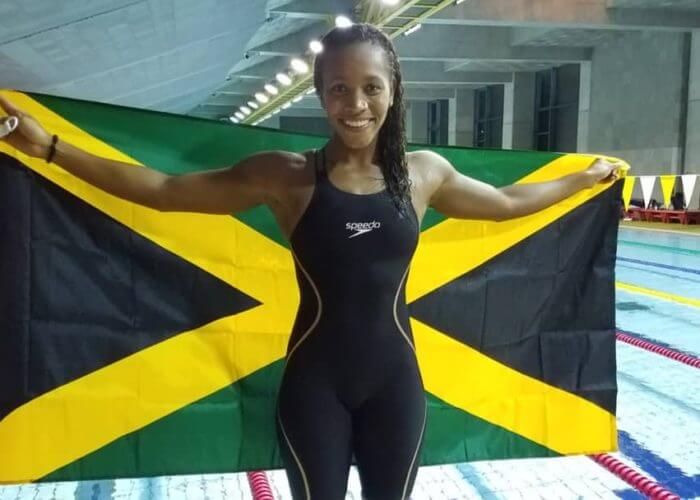
Photo Courtesy: Alia Atkinson
Not that she realised it at the time.
“When I looked at the wall I actually thought I got touched out again. So I thought it was the same thing like the 50.
“I remember seeing the person beside me (Meilutyte) not react – I was like that’s strange, she usually reacts a lot.
“And that’s when I turned and I looked for second and I didn’t see my name (alongside it).
“I was like wait, wait – is this the moment that I have always dreamed of but it never happened? So when I turned and saw first that was the reaction to it.”
So much emotion – world champion, joint world-record holder – and although she didn’t know at the time, Atkinson had written her own entry into the record books, the magnitude of which took a long time to absorb.
She said:
“I was ecstatic I actually won and it wasn’t until I came out of the pool that I saw I had equalled the world record. I was like – oh, oh wow.
“And then it wasn’t until maybe later that day when news articles said it and I couldn’t even comprehend all that because I was still trying to comprehend the fact that I won a world title. Like – one thing at a time!
“Slowly but surely it started to all seep in and I think over the years – probably 2017 is when it really started to sink in, when I started to see the other children from all over the world.
“When I go to worlds or to all the different meets and I see the female or even male swimmers from the Middle East, from the African countries, from the Caribbean, from the Pacific Islands – all the minority countries in swimming.
“And them coming up and being like ‘I’m so happy to see you, I’m so glad that you’re here, thank you so much for representing, thank you so much’.
“I never realised what the image had done, I never realised that.”
Watching Simone Manuel Reach The Pinnacle
Roughly 19 months after Atkinson became the first black woman to win a world title came the Olympics in Rio de Janeiro.
It was Atkinson’s fourth Games after making her debut as a 15-year-old at Athens 2004.
After her title in 2014, Atkinson had gone on to visit the long-course world podium the following year in Kazan, Russia.
There she got silver over 50m in a national record of 30.11 behind Sweden’s Jennie Johansson and ahead of Yulia Efimova, who had completed her 16-month drug ban in February that year.
Atkinson also claimed bronze over 100m, edging out Japan’s Kanako Watanabe by 0.01 in 1:06.42.
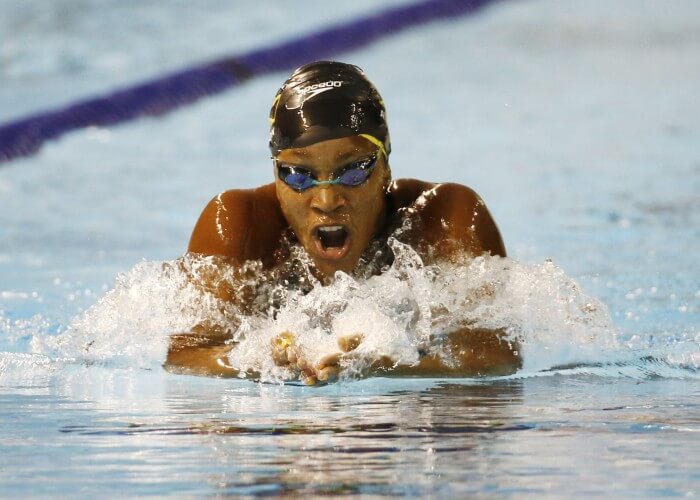
Photo Courtesy: Rob Schumacher/USA Today Sports Images
It all augured well going into the Games in Brazil and she qualified equal fifth for the final with Katie Meili of the United States in 1:06.52.
However, there was some disappointment for Atkinson who would finish eighth, 1.58secs down on her semi-final time in 1:08.10.
Three days later Atkinson looked on as Manuel too made history by becoming the first black woman to win an individual gold medal in the pool when she tied for first over 100 free with Penny Oleksiak.
Atkinson was thrilled but not entirely surprised given she had observed the American for some time.
She said:
“Oh my gosh! I remember seeing her in 2013 as one of the black swimmers on the US team and I was like ‘you go girl!’
“The only one I remember is Maritza Correia in 2004 (won 4×100 silver with the USA) – so I was like ‘you go’ – she was very young then.
“I’ve seen her progression over the years and I was like of course, it was more a matter of course.
“I’ve seen you there from 2013 growing and growing and growing – this is the outcome of working hard and excellence. This was going to happen – it happened.
“Everything that I had thought about it had just come to fruition – I was like ‘good job, you’ve done it and you’ll continue to do it’.
“For her to come back and do it in 2021 would be exceptional.”
Atkinson Ready To Roar At The ISL
As Friday dawns, so does the start of the second season of the ISL in Budapest where Atkinson will represent London Roar after being part of Team Iron in the inaugural campaign.
The 31-year-old welcomes the competition in the light of the postponement of Tokyo 2020 – pushed back until July 2021 because of Covid-19 – as well as the financial support it delivers.
She said:
“I thought going fast in practise, trying to emulate a competition in practise, would be enough but it’s completely different. Just the mindset alone is different.
“Physically maybe you can produce the same amount of effort but mentally, getting into that zone, getting into that gear is a completely different person.
“I have to be thankful there is an ISL going on – whatever happens – hopefully it will be for the best and everyone is safe.
“But just for the fact that we get a chance to do something this year because everybody was so ready for the Olympics. And to have that as a big letdown and to have a whole four years of training go to waste, you have something this year to perk you back up again.
“See where you are, how you feel, fall in love with the sport again, give it another go for another couple of months before trials. I think it’s great for us to have that distraction and to keep us motivated.”
So too is she looking forward to training with fellow Roar breaststroker Adam Peaty, saying:
“I am secretly waiting to push off the wall beside him and test out my underwaters.”
Atkinson will find herself in the unusual position of being in a team environment and competing in relays, so used to travelling and competing alone.
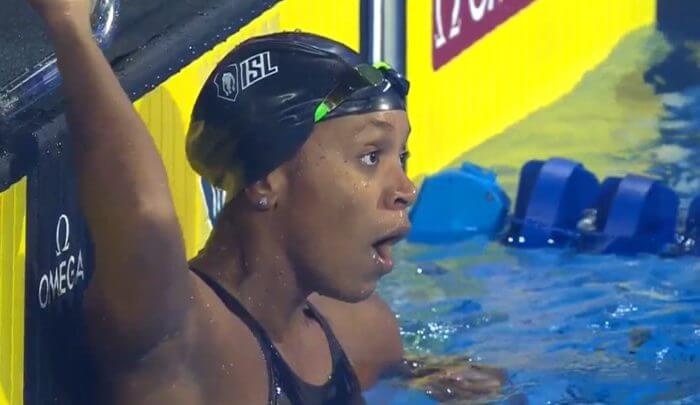
“I am used to me, myself and I.
“I do enjoy it. So having a relay: I’ve done it at the lower meet, but never a big, competitive meet.
“It’s fantastic to come up and know one of the top-name swimmers is coming along.
“You don’t have to put so much pressure on yourself: I need to be first – oh no, the other team-mates have got you. And I never had that before.
“So it’s great to know you can trust the team and lean on the team as well because they are just as strong as you.
“The ISL is great to get to know the other swimmers because when we get to see them – or when I see them at least – they’re always in their mode, they’re in game mode already.
“So you don’t get to know them or get a sense of who they are. So now when there’s downtime you see that so and so is very funny or so and so is this, get to know a bit more behind the swimmer.”
Advertising: Shop At Swim360
.jpg)
- ISL WEBSITE
- SEASON 2 SCHEDULE
- EUROPEAN ROSTERS
- AMERICAN ROSTERS
- TOKYO & TORONTO NEW ROSTERS
- CBS TV AGREEMENT
- MATCH ONE RESULTS (CONDORS, ENERGY, CURRENT, BREAKERS)
- MATCH TWO RESULTS (ROAR, IRON, TRIDENT, CENTURIONS)
- MATCH THREE RESULTS (CURRENT, FROG KINGS, TITANS, CENTURIONS)
- MATCH FOUR RESULTS (CONDORS, IRON, BREAKERS, TRIDENT)
- MATCH FIVE RESULTS (ROAR, CURRENT, FROG KINGS, TRIDENT)
- MATCH SIX RESULTS (ENERGY, TITANS, BREAKERS, CENTURIONS)
- MATCH SEVEN RESULTS (ENERGY, IRON, TITANS, TRIDENT)
- MATCH EIGHT RESULTS (CONDORS, ROAR, FROG KINGS, BREAKERS)
- MATCH NINE RESULTS (ENERGY, FROG KINGS, IRON, TITANS)
- MATCH TEN RESULTS (CONDORS, CURRENT, ROAR, CENTURIONS)
- SEMI ONE RESULTS
- SEMI TWO RESULTS
- GRAND FINAL RESULTS



